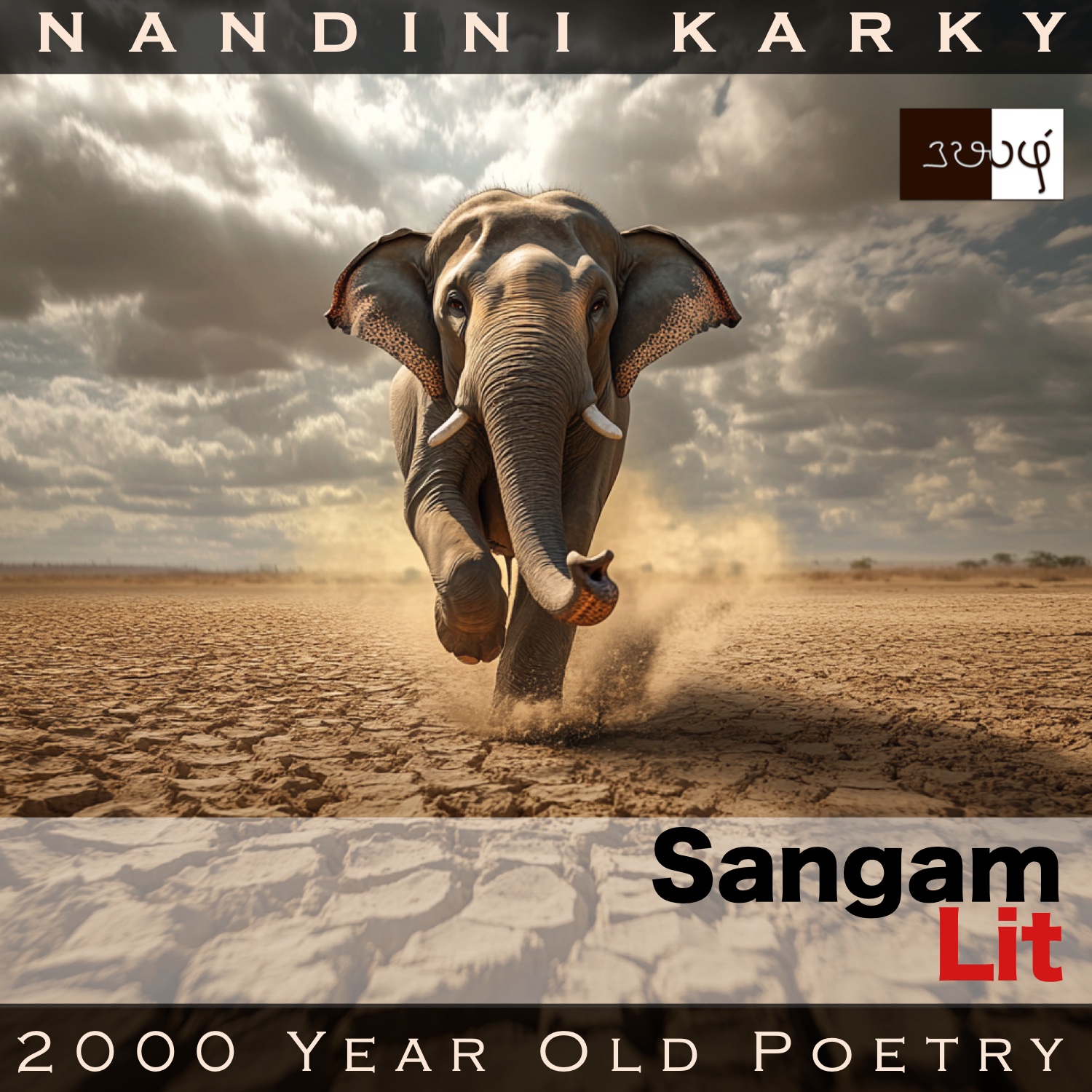Podcast: Play in new window | Download
Subscribe: Apple Podcasts | Spotify | Amazon Music | Android | iHeartRadio | TuneIn | RSS | More
In this episode, we perceive the lady’s inferences about the man’s course of action, as portrayed in Sangam Literary work, Kalithogai 24, penned by the Chera King Paalai Paadiya Perunkadunko. The verse is situated in the ‘Paalai’ or ‘Drylands landscape’ and sketches a dream study.

‘நெஞ்சு நடுக்குறக் கேட்டும், கடுத்தும், தாம்
அஞ்சியது ஆங்கே அணங்காகும்’ என்னும் சொல்
இன் தீம் கிளவியாய்! வாய் மன்ற: நின் கேள்
புதுவது பல் நாளும் பாராட்ட, யானும்,
‘இது ஒன்று உடைத்து’ என எண்ணி, அது தேர,
மாசு இல் வண் சேக்கை மணந்த புணர்ச்சியுள்,
பாயல் கொண்டு என் தோள் கனவுவார், ‘ஆய் கோல்
தொடி நிரை முன் கையாள் கையாறு கொள்ளாள்,
கடி மனை காத்து, ஓம்ப வல்லுவள்கொல்லோ
இடு மருப்பு யானை இலங்கு தேர்க்கு ஓடும்
நெடு மலை வெஞ் சுரம் போகி, நடு நின்று,
செய் பொருள் முற்றும் அளவு?’ என்றார்; ஆயிழாய்!
தாம் இடை கொண்டது அதுவாயின், தம் இன்றி
யாம் உயிர் வாழும் மதுகை இலேமாயின்,
‘தொய்யில் துறந்தார் அவர்’ என, தம்வயின்,
நொய்யார் நுவலும் பழி நிற்ப, தம்மொடு
போயின்று, சொல், என் உயிர்.
The lady’s imaginative mind is highlighted here! The words can be translated as follows:
“The saying ‘Whatever makes the heart quiver with fear, when hearing about it or suspecting the same, is sure to turn true and cause great suffering’ is the absolute truth, O maiden who speaks sweet words! Listen to this: As he took to praising me for many days, I thought, ‘There’s something behind this’. That became crystal clear when one night after our union on the fine and flawless bed, he slept on my arms and had a dream, in which he said, ‘Does the maiden, wearing well-etched neat row of bangles on her forearms, have the ability to take care of our good home, without feeling helpless, when I leave to the tall mountains in the hot drylands, wherein an elephant with a sharp tusk runs towards a shining mirage? Will she stand firm with a balanced mind, till I finish my mission of earning wealth?’. O maiden wearing exquisite ornaments, if that’s what he has in his mind, then I don’t have the strength to live anymore. Tell him that when compassionless others blame and exclaim, ‘The man has forsaken her ‘thoyyil’ painted arms’, it too shall part away with him, this life of mine!”
Let’s explore the nuances. The verse is situated in the context of the man’s parting from his lady after marriage and the lady says these words to her confidante. She starts by commenting on the truth of a common saying, ‘Whatever you fear will unfold and afflict you’. She continues by describing why she thinks so. The lady tells her confidante about how she noted marked changes in the man, in the way he kept praising the lady for every little thing. She suspected that something was afoot. Fulfilling her fears, one night, the man seems to slept on her arms, and in his dreams, muttered wondering if the lady had the strength to bear his parting, as he prepared to leave to the drylands, where elephants rush towards mirages, and would she hold the home front with strength until he returns. It’s amazing to see such clarity in words muttered in sleep. But let’s grant this licence to our poet, for the sake of coherence!
Returning, we see the lady shocked hearing these words and she declares to her confidante that if this is the true intention of the man’s mind, then she does not have the strength to go on. She concludes by asking her confidante to inform the man that she sure cannot hear the blame of the townsfolk about how the man abandoned her painted arms, and that her life is sure to part away with him! Setting aside the helpless stance of this lady, we can zoom on to that interesting saying in the beginning. These words sound very close to the concept of a ‘self-fulfilling prophecy’. Centuries apart, cultures apart, how do these connections in philosophy occur? In a subtle way, the verse also showcases the powers of observation and focus on minute things in relationships, which talk about a mindful society back then!




Share your thoughts...